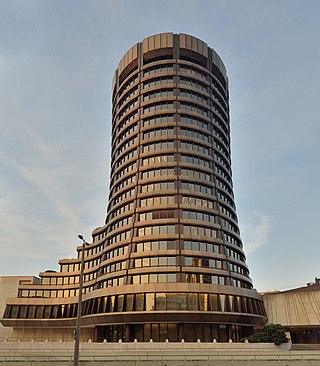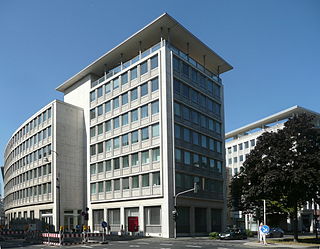Related Research Articles

The Bank for International Settlements (BIS) is an international financial institution which is owned by member central banks. Its primary goal is to foster international monetary and financial cooperation while serving as a bank for central banks. With its establishment in 1929, its initial purpose was to oversee the settlement of World War I war reparations.
Operational risk is the risk of losses caused by flawed or failed processes, policies, systems or events that disrupt business operations. Employee errors, criminal activity such as fraud, and physical events are among the factors that can trigger operational risk. The process to manage operational risk is known as operational risk management. The definition of operational risk, adopted by the European Solvency II Directive for insurers, is a variation adopted from the Basel II regulations for banks: "The risk of a change in value caused by the fact that actual losses, incurred for inadequate or failed internal processes, people and systems, or from external events, differ from the expected losses". The scope of operational risk is then broad, and can also include other classes of risks, such as fraud, security, privacy protection, legal risks, physical or environmental risks. Operational risks similarly may impact broadly, in that they can affect client satisfaction, reputation and shareholder value, all while increasing business volatility.
The Basel Accords refer to the banking supervision accords issued by the Basel Committee on Banking Supervision (BCBS).
Large and complex financial institutions (LCFI) are systemically important financial institutions, also referred to colloquially as bulge bracket banks, that if they failed would cause a Systemic banking crisis. The term is used in the context of systemic risk which concerns central banks, financial regulators and the Bank for International Settlements and has led to the term too big to fail.
Basel II is the second of the Basel Accords, which are recommendations on banking laws and regulations issued by the Basel Committee on Banking Supervision. It is now extended and partially superseded by Basel III.

The Basel Committee on Banking Supervision (BCBS) is a committee of banking supervisory authorities that was established by the central bank governors of the Group of Ten (G10) countries in 1974. The committee expanded its membership in 2009 and then again in 2014. As of 2019, the BCBS has 45 members from 28 jurisdictions, consisting of central banks and authorities with responsibility of banking regulation.
Tier 1 capital is the core measure of a bank's financial strength from a regulator's point of view. It is composed of core capital, which consists primarily of common stock and disclosed reserves, but may also include non-redeemable non-cumulative preferred stock. The Basel Committee also observed that banks have used innovative instruments over the years to generate Tier 1 capital; these are subject to stringent conditions and are limited to a maximum of 15% of total Tier 1 capital. This part of the Tier 1 capital will be phased out during the implementation of Basel III.

Herstatt Bank was a privately owned bank in the German city of Cologne. It went bankrupt on 26 June 1974, an event widely referred to as the Herstatt crisis. Herstatt's failure specifically highlighted the importance of settlement risk in foreign-exchange markets, which became correspondingly known as Herstatt risk.
Sir Paul Tucker is a British economist, central banker, and author. He was formerly the Deputy Governor of the Bank of England, with responsibility for financial stability, and served on the Bank's Monetary Policy Committee from June 2002 until October 2013 and its interim and then full Financial Policy Committee from June 2011. In November 2012 he was turned down for the position of governor in favour of Mark Carney. In June 2013, Tucker announced that he would leave the Bank of England, and later that he would be moving to Harvard. He was knighted in the 2014 New Year Honours for services to central banking. His first book, Unelected Power, was published in May 2018 and his second book, Global Discord was published in November 2022.

The Institute of International Finance (IIF) is the association or trade group for the global financial services industry. It was created by 38 banks of leading industrialized countries in 1983 in response to the international debt crisis of the early 1980s, and has since expanded to represent more than 400 firms from more than 60 countries. IIF members include commercial and investment banks, asset managers, insurance companies, professional services firms, exchanges, sovereign wealth funds, hedge funds, central banks and development banks.
The Financial Stability Forum (FSF) was a group consisting of major national financial authorities such as finance ministries, central bankers, and international financial bodies. It was first convened in April 1999 in Washington. At the 2009 G20 London summit, the G20 nations established a successor to the FSF, called the Financial Stability Board with an expanded membership and broadened mandate.
The Financial Stability Board (FSB) is an international body that monitors and makes recommendations about the global financial system. It was established in the 2009 G20 Pittsburgh Summit as a successor to the Financial Stability Forum (FSF). The Board includes all G20 major economies, FSF members, and the European Commission. Hosted and funded by the Bank for International Settlements, the board is based in Basel, Switzerland, and is established as a not-for-profit association under Swiss law.
The International Association of Insurance Supervisors (IAIS) is a voluntary membership organization of insurance supervisors from more than 200 jurisdictions, constituting 97% of the world's insurance premiums. It is the international standards-setting body for the insurance sector. The IAIS was established in 1994 and operates as a verein, a type of non-profit organisation under Swiss Civil Law.
Macroprudential regulation is the approach to financial regulation that aims to mitigate risk to the financial system as a whole. In the aftermath of the late-2000s financial crisis, there is a growing consensus among policymakers and economic researchers about the need to re-orient the regulatory framework towards a macroprudential perspective.
Basel III is the third Basel Accord, a framework that sets international standards for bank capital adequacy, stress testing, and liquidity requirements. Augmenting and superseding parts of the Basel II standards, it was developed in response to the deficiencies in financial regulation revealed by the financial crisis of 2007–08. It is intended to strengthen bank capital requirements by increasing minimum capital requirements, holdings of high quality liquid assets, and decreasing bank leverage.

Arnout Henricus Elisabeth Maria "Nout" Wellink is a Dutch economist and former central banker.
A systemically important financial institution (SIFI) is a bank, insurance company, or other financial institution whose failure might trigger a financial crisis. They are colloquially referred to as "too big to fail".

The International Association of Deposit Insurers (IADI) was formed on 6 May 2002 with the purpose of sharing deposit insurance expertise with the world and contributing to the stability of financial systems as the standard setter for deposit insurance with a global and expanding membership.
Basel III: Finalising post-crisis reforms, sometimes called the Basel III Endgame, Basel 3.1 or CRR3, are changes to international standards for bank capital requirements that were agreed by the Basel Committee on Banking Supervision (BCBS) in 2017 and are due for implementation in January 2023. They amend the international banking standards known as the Basel Accords.

Fernando Restoy Lozano is a Spanish economist who has been the Chairman of the Financial Stability Institute of the Bank for International Settlements since early 2017. In his previous position he was Vice Governor of the Bank of Spain from 2012 to 2017, and in parallel Chairman of Fondo de Reestructuración Ordenada Bancaria from 2012 to 2015.
References
- ↑ "Market Analysis, Trade Execution and Risk Management" . Retrieved 2024-06-22.
- ↑ "A speech John G. Heimann on the role of the FSI" (PDF). Archived from the original (PDF) on 2012-10-19. Retrieved 2006-10-28.
- ↑ "Press release: BIS appoints new Chairman of the Financial Stability Institute". bis.org. 31 October 2000. Retrieved 21 May 2016.
- ↑ "Fernando Restoy appointed Chair of the Financial Stability Institute of the Bank for International Settlements" (PDF). bde.es. Banco de España. 29 July 2016. Retrieved 29 July 2016.
- ↑ "Financial Stability Institute (FSI) publications". bis.org. Retrieved 21 May 2016.